外研版英语必修二Module 2 No Drugs知识点课件(38张ppt)
文档属性
| 名称 | 外研版英语必修二Module 2 No Drugs知识点课件(38张ppt) | 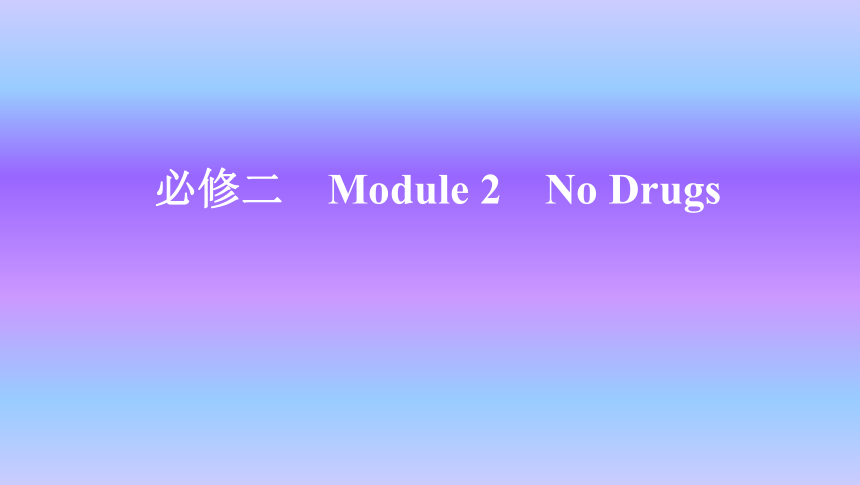 | |
| 格式 | zip | ||
| 文件大小 | 459.0KB | ||
| 资源类型 | 教案 | ||
| 版本资源 | 外研版 | ||
| 科目 | 英语 | ||
| 更新时间 | 2019-11-14 22:25:28 | ||
图片预览

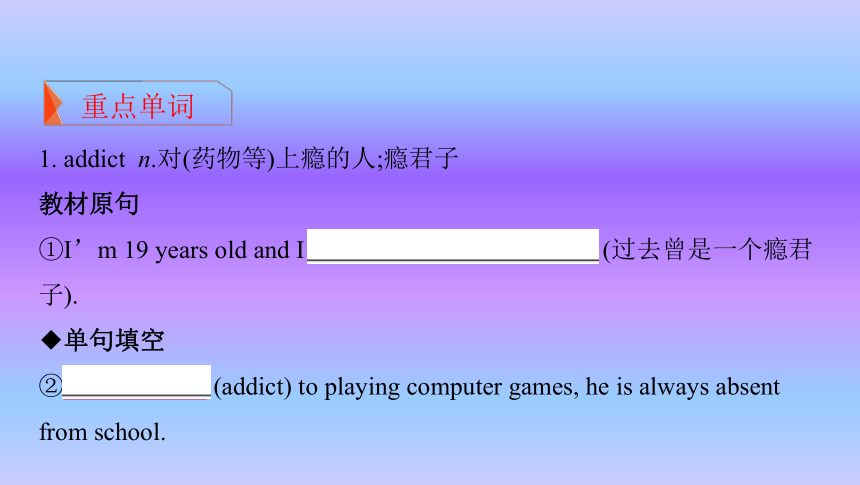
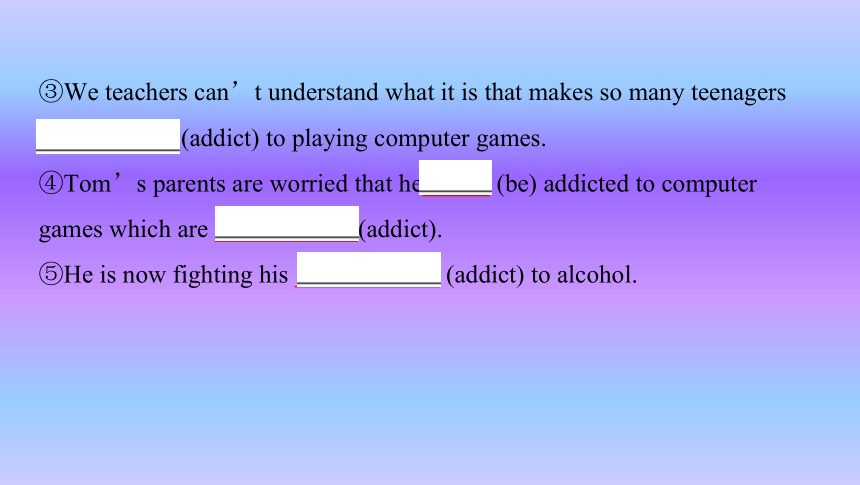
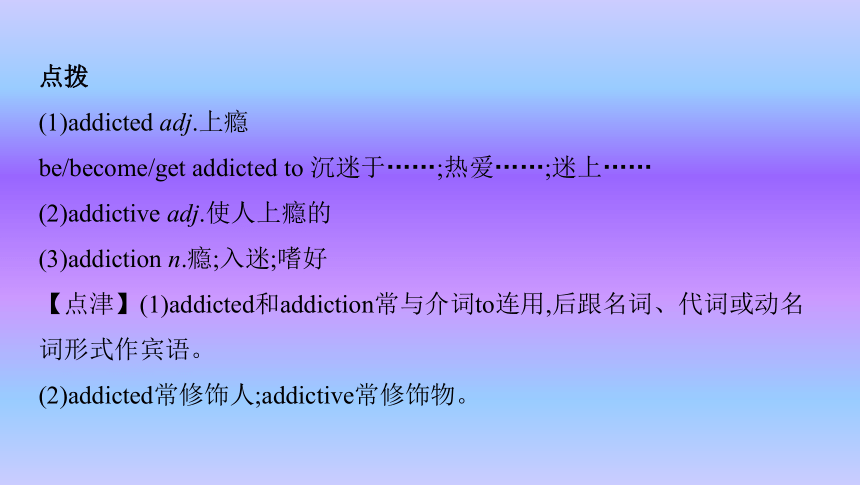
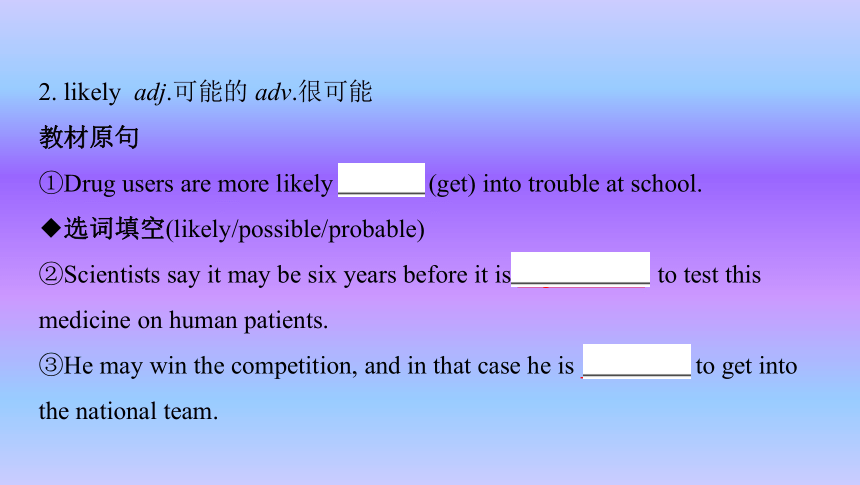

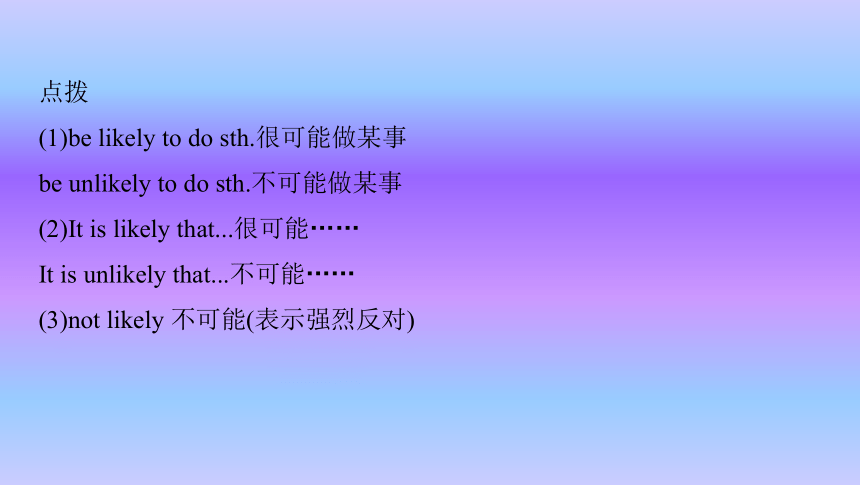
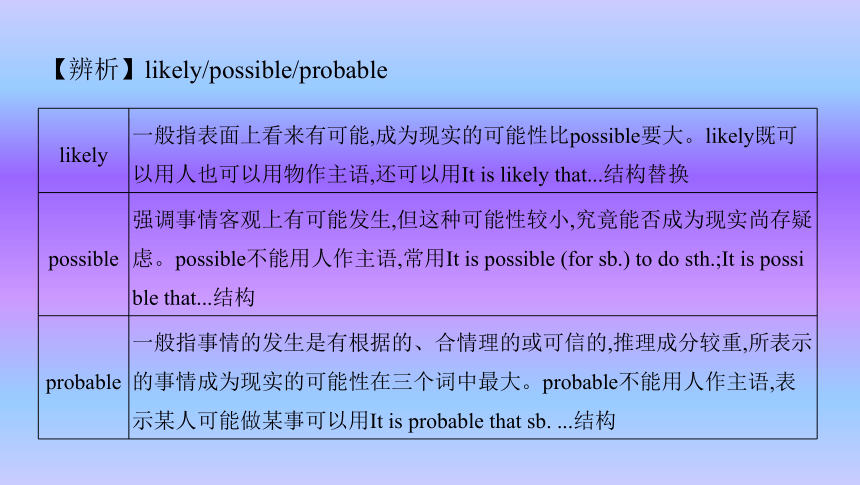
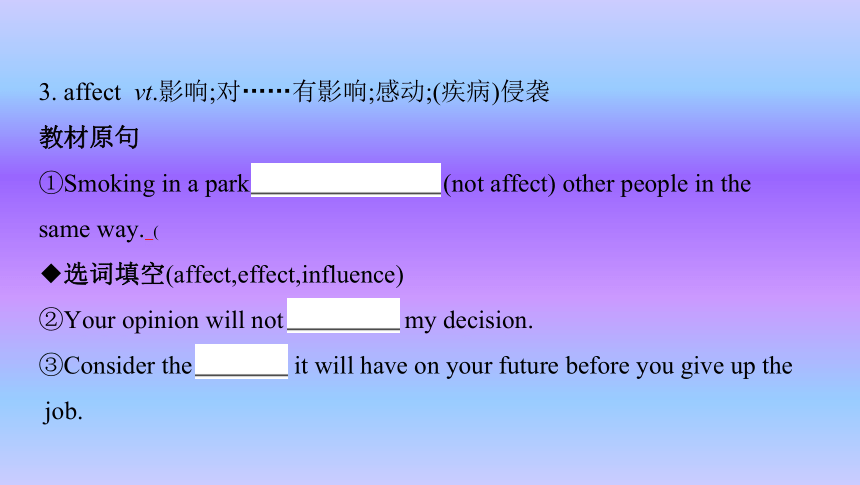

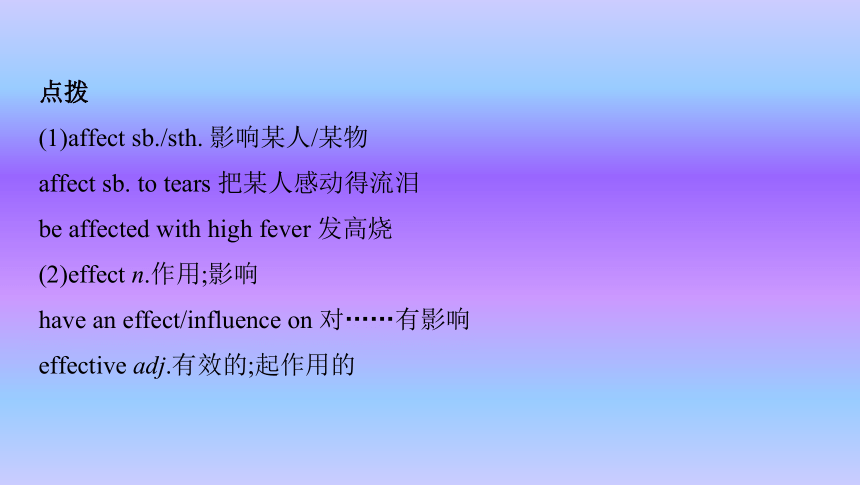
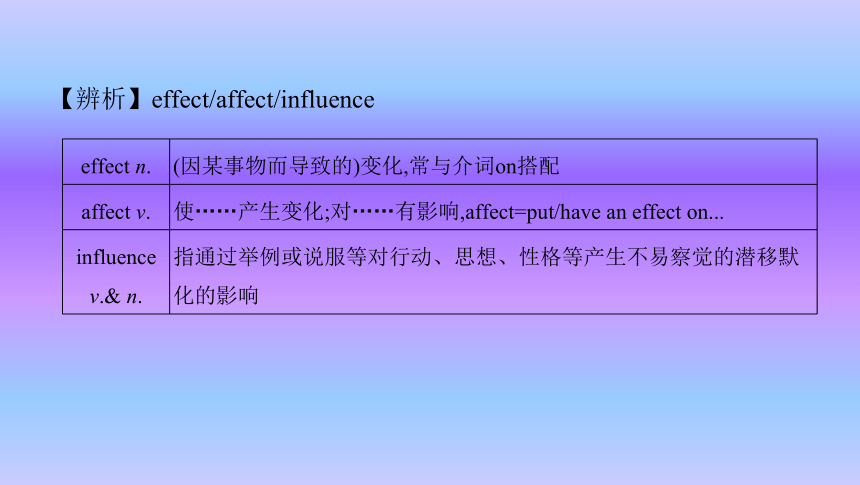
文档简介
课件38张PPT。必修二 Module 2 No Drugs1. addict n.对(药物等)上瘾的人;瘾君子
教材原句
①I’m 19 years old and I ????used to be a drug addict????(过去曾是一个瘾君 子).
◆单句填空
② Addicted???? (addict) to playing computer games, he is always absent
from school.
重点单词③We teachers can’t understand what it is that makes so many teenagers addicted???? (addict) to playing computer games.
④Tom’s parents are worried that he is???? (be) addicted to computer games which are addictive????(addict).
⑤He is now fighting his addiction???? (addict) to alcohol.点拨
(1)addicted adj.上瘾
be/become/get addicted to 沉迷于……;热爱……;迷上……
(2)addictive adj.使人上瘾的
(3)addiction n.瘾;入迷;嗜好
【点津】(1)addicted和addiction常与介词to连用,后跟名词、代词或动名 词形式作宾语。
(2)addicted常修饰人;addictive常修饰物。2. likely adj.可能的 adv.很可能
教材原句
①Drug users are more likely???to get???(get) into trouble at school.
◆选词填空(likely/possible/probable)
②Scientists say it may be six years before it is possible???? to test this medicine on human patients.
③He may win the competition, and in that case he is likely???? to get into the national team.④It is likely/possible/probable????that he will come to the party.
⑤—Would she mind playing against her former teammates?
—Not likely????. She is willing to play against any tough players.点拨
(1)be likely to do sth.很可能做某事
be unlikely to do sth.不可能做某事
(2)It is likely that...很可能……
It is unlikely that...不可能……
(3)not likely 不可能(表示强烈反对)【辨析】likely/possible/probable3. affect vt.影响;对……有影响;感动;(疾病)侵袭
教材原句
①Smoking in a park???doesn’t affect???(not affect) other people in the same way. ?(
◆选词填空(affect,effect,influence)
②Your opinion will not affect???? my decision.
③Consider the effect????it will have on your future before you give up the job.④We’re having a meeting in half an hour. The decision to be made at the meeting will influence???? the future of our company.
◆单句填空
⑤We want to know whether the drug has an effect on???? people’s health.
⑥People are now seeking effective????(effect) ways of using the least en- ergy to create the greatest benefit.
⑦Deeply affected????(affect) by the film, she couldn’t help weeping.点拨
(1)affect sb./sth. 影响某人/某物
affect sb. to tears 把某人感动得流泪
be affected with high fever 发高烧
(2)effect n.作用;影响
have an effect/influence on 对……有影响
effective adj.有效的;起作用的【辨析】effect/affect/influence4. recognise(recognize) vt.认识;认知;认出;承认,认可
教材原句
①Participants learn to recognize????(recognise) smoking triggers (things that start them smoking) and they try to set a date in the future when they will stop smoking.
◆单句填空
②The film star wears sunglasses. Therefore, he can go shopping without being recognized???? (recognize).③If you want to get your ability recognized????(recognize), you have to show it in your work rather than complain all day.
④Mo Yan was awarded the Nobel Prize in Literature in 2012 in recogni- tion of????his contribution to the world literature.
⑤Arthur Miller is universally recognized as???? one of the greatest dramatists of the 20th century.◆完成句子
⑥I haven’t seen Sara since she was a little girl, and she has changed be-
yond recognition????. 从萨拉还是个小女孩的时候我就没见过她了,她已 变得我都认不出来了。
⑦ It is recognized that????environmental pollution has become one of the most serious problems that people face.人们认为环境污染已成为人们面 临的最严重的问题之一。点拨
(1)recognize sb./sth.辨认出某人/某物
recognize...as/to be承认……是;认出……是
be recognized as/to be被认为是……
recognize sb./sth. by/from根据……认出某人/某物
(2)It is recognized that...人们公认……
(3)recognition n.认出;认可;承认 in recognition of 认可;承认
out of/beyond recognition 认不出来【联想】
表示“认为……是……”的短语还有:regard...as...;consider...as...;see...
as...;view...as...;think of...as...;look on...as...;treat...as...。5. ban v.& n.禁止;取缔;禁令
教材原句
①The government is thinking about banning????smoking????(smoke) on pub- lic transport.
◆单句填空
②The Chinese government has decided to ban smoking????(smoke)in pub- lic places across the country.
③He says the proposals may include a ban on????littering.◆完成句子
④He was banned from driving????for three years because of the accident he caused.
因为他造成了那起事故,所以他被禁驾三年。
⑤The Chinese government put a ban on/banned????eating wild animals.
中国政府下令禁止吃野生动物。点拨
(1)ban sb. from doing sth. 禁止某人做某事
ban doing sth. 禁止做某事
(2)a ban on...有关……的禁令
put a ban on禁止1. break into 破门而入;强行闯入;突然开始
教材原句
①The next day, I broke ????into????a house and stole a television and a video recorder.
◆介(副)词填空
②The printing machines are always breaking down???.重点短语③I was still sleeping when the fire broke out????, and then it spread quickly.
④We arrived at work in the morning and found that somebody had broken into???? the office during the night.
⑤I’m surprised to hear that Sue and Paul have broken up????. They seemed very happy together when I last saw them.
⑥We were having a meeting when suddenly Tom broke in???? and said something urgent.◆完成句子
⑦The boy tried to break away from????his father but in vain.
那个男孩想挣脱他的父亲,但没成功。
⑧Scientists think they are beginning to break through???? in the fight
a-gainst cancer. 科学家们认为他们开始在与癌症的战斗中取得突破。点拨
break in闯入;打断;插嘴 break into 强行闯入;破门而入
break out爆发;突然发生 break through克服;突破;冲垮
break down (身体)垮掉;(机器)出故障;(化学)分解
break up (关系)破裂;拆散 break away from脱离;突然挣脱
【点津】break into中的into是介词,其后面接宾语;而break in中的in是副 词,属不及物动词短语,其后不能接宾语。2. give up 戒除;放弃;让给
教材原句
①And here are some ideas to help people to give ????up???? smoking.
◆介(副)词填空
②At first Robert wouldn’t let his daughter go diving, but eventually he gave in????as she was so confident about her skills.
③Body language can give away????a lot about your mood, so standing with your arms folded can send out a signal that you are being defensive.④The news of the mayor’s coming to our school for a visit was given
????out???? on the radio yesterday.
⑤This is a very special flower and it can give off???? a strong sweet per- fume at night.
⑥By no means will we give in to???? the unreasonable demand.点拨
give up sth. to 把某物让给/捐献给
give away 暴露;泄露;分发;捐赠
give in 屈服;让步
give in to 屈服于;向……让步
give off 发出(气体、味道等);发散(光线等)
give out 分发;公布;用尽;停止运行3. belong to属于;为……的财产;为……的一员
教材原句
①Read parts 1—6 and decide which article they ????belong to????(属于).
◆完成句子
②A Japanese map drawn by the Japanese military in 1876 proves that the islands don’t belong to??Japan.1876年日本军方绘制的一张日本地图证明 这些岛不属于日本。③The taxi driver often reminds passengers to take their belongings ?? when
they leave the car.
出租车司机经常提醒乘客下车时带走自己的东西。
◆单句填空
④As is known to us all, China is a developing country belonging????(be- long)to the third world.=As is known to us all, China is a developing coun- try which belongs????(belong) to the third world.点拨
(1)belong to中的to是介词,后接名词或代词。
(2)belong to不用于进行时态,也没有被动形式。
(3)belongings n.所有物;财产 1. “否定词+比较级”表示最高级
教材原句
①I couldn’t agree ????more????(much).
◆完成句子
②I have never????heard such a better????voice.
我从来没有听过比这更好的嗓音。
③You couldn’t have bought a better????one. 你买的这个好极了。重点句型④You can’t be careful enough/too careful????while driving a car,for acci- dents happen frequently.
你开车时再小心也不过分,因为交通事故经常发生。
◆一句多译
朱莉娅是她班上最高的女生。
⑤Julia is taller than any other girl????in her class.
⑥Julia is taller than all the other girls????in her class.
⑦Julia is taller than any of the other girls????in her class.⑧Julia is taller than the rest of the girls????in her class.
⑨Julia is the tallest????girl in her class.点拨
(1)can’t/couldn’t+比较级,该句型表示“非常……;不能再……”,从表 面上看是否定形式,实际上是用否定形式表示肯定的概念,表达最高级 的含义。
(2)比较级在以下几种句式中均表示最高级含义:
比较级+than+(3)完成时+never+so+形容词(副词)/so+形容词+a(n)+单数名词/such+形 容词+名词
(4)can’t...+形容词(副词)+enough/too+形容词/副词2. whatever引导让步状语从句
教材原句
①???Whatever you are doing????(无论你正在做什么) when you want to smoke—do something else!
◆用whatever,no matter what, however填空
②The lawyer seldom wears anything other than a suit whatever???? the season is.③ However???? hungry I am, I never seem to be able to finish off this loaf
of bread.
④Some people believe whatever???? has happened before or is happening now will repeat itself in the future.
⑤She is very dear to us. We have been prepared to do whatever???? it takes to save her life.
⑥Believe me or not. I’m always on your side whatever/no matter what?
difficulty you have.点拨
(1)whatever、whoever、whichever、whomever既可引导名词性从句,也 可引导让步状语从句,在引导让步状语从句时相当于no matter what/who /which/whom。
(2)whenever、wherever、however引导让步状语从句,相当于no matter when/where/how。
(3)however相当于no matter how。句式结构:however+形容词/副词+主 语+谓语。
教材原句
①I’m 19 years old and I ????used to be a drug addict????(过去曾是一个瘾君 子).
◆单句填空
② Addicted???? (addict) to playing computer games, he is always absent
from school.
重点单词③We teachers can’t understand what it is that makes so many teenagers addicted???? (addict) to playing computer games.
④Tom’s parents are worried that he is???? (be) addicted to computer games which are addictive????(addict).
⑤He is now fighting his addiction???? (addict) to alcohol.点拨
(1)addicted adj.上瘾
be/become/get addicted to 沉迷于……;热爱……;迷上……
(2)addictive adj.使人上瘾的
(3)addiction n.瘾;入迷;嗜好
【点津】(1)addicted和addiction常与介词to连用,后跟名词、代词或动名 词形式作宾语。
(2)addicted常修饰人;addictive常修饰物。2. likely adj.可能的 adv.很可能
教材原句
①Drug users are more likely???to get???(get) into trouble at school.
◆选词填空(likely/possible/probable)
②Scientists say it may be six years before it is possible???? to test this medicine on human patients.
③He may win the competition, and in that case he is likely???? to get into the national team.④It is likely/possible/probable????that he will come to the party.
⑤—Would she mind playing against her former teammates?
—Not likely????. She is willing to play against any tough players.点拨
(1)be likely to do sth.很可能做某事
be unlikely to do sth.不可能做某事
(2)It is likely that...很可能……
It is unlikely that...不可能……
(3)not likely 不可能(表示强烈反对)【辨析】likely/possible/probable3. affect vt.影响;对……有影响;感动;(疾病)侵袭
教材原句
①Smoking in a park???doesn’t affect???(not affect) other people in the same way. ?(
◆选词填空(affect,effect,influence)
②Your opinion will not affect???? my decision.
③Consider the effect????it will have on your future before you give up the job.④We’re having a meeting in half an hour. The decision to be made at the meeting will influence???? the future of our company.
◆单句填空
⑤We want to know whether the drug has an effect on???? people’s health.
⑥People are now seeking effective????(effect) ways of using the least en- ergy to create the greatest benefit.
⑦Deeply affected????(affect) by the film, she couldn’t help weeping.点拨
(1)affect sb./sth. 影响某人/某物
affect sb. to tears 把某人感动得流泪
be affected with high fever 发高烧
(2)effect n.作用;影响
have an effect/influence on 对……有影响
effective adj.有效的;起作用的【辨析】effect/affect/influence4. recognise(recognize) vt.认识;认知;认出;承认,认可
教材原句
①Participants learn to recognize????(recognise) smoking triggers (things that start them smoking) and they try to set a date in the future when they will stop smoking.
◆单句填空
②The film star wears sunglasses. Therefore, he can go shopping without being recognized???? (recognize).③If you want to get your ability recognized????(recognize), you have to show it in your work rather than complain all day.
④Mo Yan was awarded the Nobel Prize in Literature in 2012 in recogni- tion of????his contribution to the world literature.
⑤Arthur Miller is universally recognized as???? one of the greatest dramatists of the 20th century.◆完成句子
⑥I haven’t seen Sara since she was a little girl, and she has changed be-
yond recognition????. 从萨拉还是个小女孩的时候我就没见过她了,她已 变得我都认不出来了。
⑦ It is recognized that????environmental pollution has become one of the most serious problems that people face.人们认为环境污染已成为人们面 临的最严重的问题之一。点拨
(1)recognize sb./sth.辨认出某人/某物
recognize...as/to be承认……是;认出……是
be recognized as/to be被认为是……
recognize sb./sth. by/from根据……认出某人/某物
(2)It is recognized that...人们公认……
(3)recognition n.认出;认可;承认 in recognition of 认可;承认
out of/beyond recognition 认不出来【联想】
表示“认为……是……”的短语还有:regard...as...;consider...as...;see...
as...;view...as...;think of...as...;look on...as...;treat...as...。5. ban v.& n.禁止;取缔;禁令
教材原句
①The government is thinking about banning????smoking????(smoke) on pub- lic transport.
◆单句填空
②The Chinese government has decided to ban smoking????(smoke)in pub- lic places across the country.
③He says the proposals may include a ban on????littering.◆完成句子
④He was banned from driving????for three years because of the accident he caused.
因为他造成了那起事故,所以他被禁驾三年。
⑤The Chinese government put a ban on/banned????eating wild animals.
中国政府下令禁止吃野生动物。点拨
(1)ban sb. from doing sth. 禁止某人做某事
ban doing sth. 禁止做某事
(2)a ban on...有关……的禁令
put a ban on禁止1. break into 破门而入;强行闯入;突然开始
教材原句
①The next day, I broke ????into????a house and stole a television and a video recorder.
◆介(副)词填空
②The printing machines are always breaking down???.重点短语③I was still sleeping when the fire broke out????, and then it spread quickly.
④We arrived at work in the morning and found that somebody had broken into???? the office during the night.
⑤I’m surprised to hear that Sue and Paul have broken up????. They seemed very happy together when I last saw them.
⑥We were having a meeting when suddenly Tom broke in???? and said something urgent.◆完成句子
⑦The boy tried to break away from????his father but in vain.
那个男孩想挣脱他的父亲,但没成功。
⑧Scientists think they are beginning to break through???? in the fight
a-gainst cancer. 科学家们认为他们开始在与癌症的战斗中取得突破。点拨
break in闯入;打断;插嘴 break into 强行闯入;破门而入
break out爆发;突然发生 break through克服;突破;冲垮
break down (身体)垮掉;(机器)出故障;(化学)分解
break up (关系)破裂;拆散 break away from脱离;突然挣脱
【点津】break into中的into是介词,其后面接宾语;而break in中的in是副 词,属不及物动词短语,其后不能接宾语。2. give up 戒除;放弃;让给
教材原句
①And here are some ideas to help people to give ????up???? smoking.
◆介(副)词填空
②At first Robert wouldn’t let his daughter go diving, but eventually he gave in????as she was so confident about her skills.
③Body language can give away????a lot about your mood, so standing with your arms folded can send out a signal that you are being defensive.④The news of the mayor’s coming to our school for a visit was given
????out???? on the radio yesterday.
⑤This is a very special flower and it can give off???? a strong sweet per- fume at night.
⑥By no means will we give in to???? the unreasonable demand.点拨
give up sth. to 把某物让给/捐献给
give away 暴露;泄露;分发;捐赠
give in 屈服;让步
give in to 屈服于;向……让步
give off 发出(气体、味道等);发散(光线等)
give out 分发;公布;用尽;停止运行3. belong to属于;为……的财产;为……的一员
教材原句
①Read parts 1—6 and decide which article they ????belong to????(属于).
◆完成句子
②A Japanese map drawn by the Japanese military in 1876 proves that the islands don’t belong to??Japan.1876年日本军方绘制的一张日本地图证明 这些岛不属于日本。③The taxi driver often reminds passengers to take their belongings ?? when
they leave the car.
出租车司机经常提醒乘客下车时带走自己的东西。
◆单句填空
④As is known to us all, China is a developing country belonging????(be- long)to the third world.=As is known to us all, China is a developing coun- try which belongs????(belong) to the third world.点拨
(1)belong to中的to是介词,后接名词或代词。
(2)belong to不用于进行时态,也没有被动形式。
(3)belongings n.所有物;财产 1. “否定词+比较级”表示最高级
教材原句
①I couldn’t agree ????more????(much).
◆完成句子
②I have never????heard such a better????voice.
我从来没有听过比这更好的嗓音。
③You couldn’t have bought a better????one. 你买的这个好极了。重点句型④You can’t be careful enough/too careful????while driving a car,for acci- dents happen frequently.
你开车时再小心也不过分,因为交通事故经常发生。
◆一句多译
朱莉娅是她班上最高的女生。
⑤Julia is taller than any other girl????in her class.
⑥Julia is taller than all the other girls????in her class.
⑦Julia is taller than any of the other girls????in her class.⑧Julia is taller than the rest of the girls????in her class.
⑨Julia is the tallest????girl in her class.点拨
(1)can’t/couldn’t+比较级,该句型表示“非常……;不能再……”,从表 面上看是否定形式,实际上是用否定形式表示肯定的概念,表达最高级 的含义。
(2)比较级在以下几种句式中均表示最高级含义:
比较级+than+(3)完成时+never+so+形容词(副词)/so+形容词+a(n)+单数名词/such+形 容词+名词
(4)can’t...+形容词(副词)+enough/too+形容词/副词2. whatever引导让步状语从句
教材原句
①???Whatever you are doing????(无论你正在做什么) when you want to smoke—do something else!
◆用whatever,no matter what, however填空
②The lawyer seldom wears anything other than a suit whatever???? the season is.③ However???? hungry I am, I never seem to be able to finish off this loaf
of bread.
④Some people believe whatever???? has happened before or is happening now will repeat itself in the future.
⑤She is very dear to us. We have been prepared to do whatever???? it takes to save her life.
⑥Believe me or not. I’m always on your side whatever/no matter what?
difficulty you have.点拨
(1)whatever、whoever、whichever、whomever既可引导名词性从句,也 可引导让步状语从句,在引导让步状语从句时相当于no matter what/who /which/whom。
(2)whenever、wherever、however引导让步状语从句,相当于no matter when/where/how。
(3)however相当于no matter how。句式结构:however+形容词/副词+主 语+谓语。
